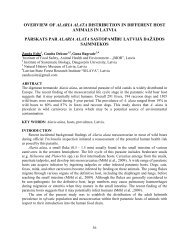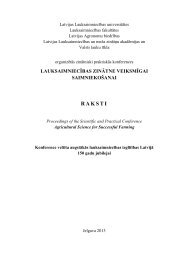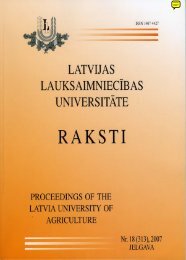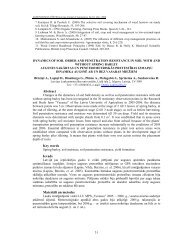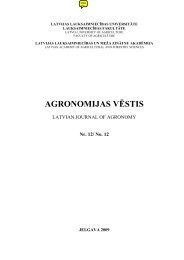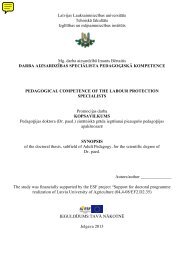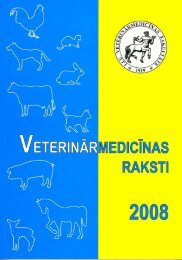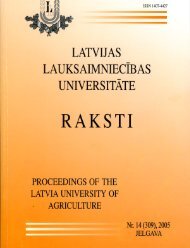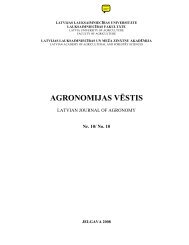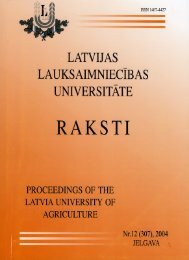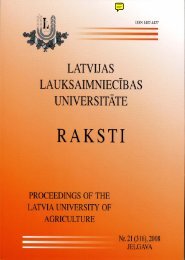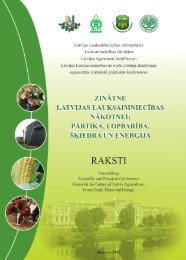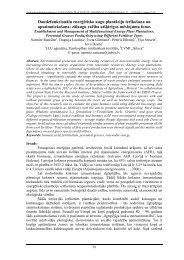Latvia University of Agriculture - Latvijas Lauksaimniecības ...
Latvia University of Agriculture - Latvijas Lauksaimniecības ...
Latvia University of Agriculture - Latvijas Lauksaimniecības ...
You also want an ePaper? Increase the reach of your titles
YUMPU automatically turns print PDFs into web optimized ePapers that Google loves.
D. Kārkliņa et al. Research at the Faculty <strong>of</strong> Food Technologyin the rye flour scalds. I. Grāmatiņa made her research on possibilities <strong>of</strong> enlarging theuse <strong>of</strong> oat flakes in a diet (Gramatina et al., 2006; 2008). The aim <strong>of</strong> her research work“Oat hydrolysates in food” was to work out a new technology for obtaining hydrolyzedoat flakes and to determine the chemical composition <strong>of</strong> soluble and insoluble fractions<strong>of</strong> hydrolyzed oat flakes. Special attention was devoted to distribution <strong>of</strong> soluble fiberβ-glucan between soluble and insoluble fractions. F. Dimiņš can be regarded as theleading researcher in honey quality studies in <strong>Latvia</strong>. His promotion work “The indices <strong>of</strong>honey quality determination” expanded and improved the already carried out researchon this theme (Dimins, Kuka, 2007; Dimins et al., 2006; 2008a; 2008b). The research <strong>of</strong>I. Beitāne’s promotion work deals with properties <strong>of</strong> prebiotics and their use in production<strong>of</strong> new functional food products, which allows supplementing dairy assortment with newfermented products.The research within project No. 5 <strong>of</strong> the State Research Program in agrobiotechnology“Innovative technologies for obtaining added value, safe and healthy food products fromgenetically, physiologically and biologically diverse raw materials <strong>of</strong> plant and animalorigin” is being carried out at the Faculty <strong>of</strong> Food Technology. The title <strong>of</strong> the project is“Production technologies <strong>of</strong> new food products rich in functional components”. The aim<strong>of</strong> the project: development <strong>of</strong> the production technologies <strong>of</strong> new food products rich infunctional components from traditional and non-traditional raw materials <strong>of</strong> plant andanimal origin.The project covers the following activities:– evaluation <strong>of</strong> the qualitative and quantitative properties <strong>of</strong> physiologically activecompounds <strong>of</strong> Origanum vulgare L. and Thymus ssp. L. collected during the researchexpeditions;– study <strong>of</strong> qualitative and quantitative changes in spices harvest depending on theclone <strong>of</strong> the spice and the growing conditions, evaluating the content and composition<strong>of</strong> volatiles as well as <strong>of</strong> the antioxidant and microbiological activity;– determination <strong>of</strong> the most suitable flaxseed varieties for oil production, anddevelopment <strong>of</strong> new production technologies for preserving active compounds usingnatural components from the plants grown in <strong>Latvia</strong>;– improvement <strong>of</strong> the production technology <strong>of</strong> bread with increased nutritional valueusing cereal varieties rich in functionally active substances and bred in <strong>Latvia</strong>;– evaluation <strong>of</strong> the content <strong>of</strong> functional components (vitamins, resistant starch,etc.) in potatoes, assessment <strong>of</strong> the changes in amino acid composition andreducing sugars in potatoes during their thermal treatment, and working out <strong>of</strong>recommendations for optimum thermal treatment parameters which would preservethe most <strong>of</strong> functionally active compounds;– development <strong>of</strong> new processing technologies <strong>of</strong> non-traditional raw materials <strong>of</strong>animal origin in order to increase the value <strong>of</strong> these products and extend theirshelf life.One <strong>of</strong> the parts <strong>of</strong> the mentioned research program is analysis <strong>of</strong> herbs grown in<strong>Latvia</strong>. In the promotion work <strong>of</strong> Z. Krūma “Plant family Lamiaceae herbs for rapeseedoil aromatization”, suitability <strong>of</strong> basil, oregano and thyme, grown in <strong>Latvia</strong>, for production<strong>of</strong> aromatized oil has been studied (Galoburda et al., 2008; Kruma et al., 2007; 2008).The volatile and phenolic compounds <strong>of</strong> the herbs grown in <strong>Latvia</strong> as well as conditionsnecessary for aromatization have been investigated.Ostrich breeding has been recently started in <strong>Latvia</strong>, therefore processing <strong>of</strong> ostrichmeat has become an urgent issue. One <strong>of</strong> the research topics is “Quality <strong>of</strong> ostrich meatand its products”. The chemical composition <strong>of</strong> ostrich meat has been analyzed andcompared to that <strong>of</strong> beef and poultry. Various physical and chemical parameters (pH,colour, texture, microbiological indices, and microstructure) <strong>of</strong> ostrich meat and beefhave been analyzed. It has been found that beef is similar to ostrich meat regardingits chemical composition. A new technology for preparing marinated ostrich meat usingsous vide treatment has been developed, and the optimum technological parametershave been established. Study <strong>of</strong> ostrich meat is currently the research topic <strong>of</strong>PhD student J. Ķīvīte.The major research directions and several promotion works associated to breadtechnology are: possibilities for improvement <strong>of</strong> wheat bread nutritive value anddevelopment <strong>of</strong> new technologies for added-value bread production using oat andbuckwheat flour (D. Kļava), biologically activated grain (T. Rakčejeva), fermented whey(E. Sturmoviča), as well as studies on baking properties <strong>of</strong> wholegrain flour made66 <strong>Latvia</strong> <strong>University</strong> <strong>of</strong> <strong>Agriculture</strong> – 70, 2009



